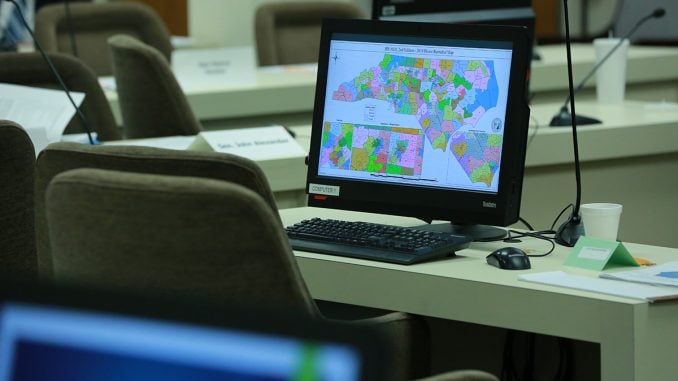
RALEIGH — North Carolina legislators returned to Raleigh on Wednesday to redraw a new congressional district map for the 2020 elections after state judges determined the current U.S. House lines can’t be used because they’re likely unlawful partisan gerrymanders.
Settling on a new map was atop the to-do list of Republican legislative leaders as they gaveled in the annual session after a nearly two-week break.
In their ruling last month, the judges stopped short of ordering a replacement map, saying they lacked authority at this stage of the lawsuit filed by Democratic and independent voters. But they encouraged the General Assembly to redraw the map on its own to avoid delaying the March 3 congressional primary. The State Board of Elections has said it needs a map by mid-December to do so.
Republicans opposed to the partisan gerrymandering ruling are still going ahead with the congressional remap.
“We’re going to be here until we get the redistricting done,” Senate leader Phil Berger said.
The House was expected to advance a map proposal by Thursday and Berger said he hoped his chamber would approve a map by Friday. When the session ends will depend on when Republicans in both chambers can agree to the same set of boundaries. Unlike other legislation, redistricting plans aren’t subject to Democratic Gov. Roy Cooper’s veto.
Republicans won 10 of the state’s 13 congressional seats under the current lines, which the GOP-controlled legislature approved in 2016. A successor map is likely to give Democrats a better chance to win additional seats, making it harder for Republicans nationally to retake the U.S. House in the November 2020 elections. A final map also could leave more than one incumbent living in the same district.
The judges suggested the legislature follow a redrawing process similar to what they used when the same judges ordered new state House and Senate districts in September, finding excessive partisan bias violated the state constitution.
Members of a special House-Senate committee meeting since last week to assemble map options agreed to keep election results and the racial makeup of voting blocs out of the drawing process.
But at the committee’s public hearing on Wednesday morning to take citizen input, several of the roughly 20 speakers said they couldn’t trust GOP mapmakers to ignore partisan considerations. They pointed to years of federal and state court rulings striking down North Carolina legislative and congressional districts that were drawn by Republicans and that they determined were tainted by racial and partisan bias.
Republican legislators “are like a pack of hound dogs released into a meat-packing plant,” citizen Gary Boos told the committee. “They just can’t help themselves. So, the only way to stop this is … don’t let the hound dogs in the meat packing plant.” He and other speakers want courts or a special commission to redo the maps, instead of lawmakers.
A few speakers criticized Democrats who filed several of this decade’s lawsuits, accusing them of seeking political power through the courts, rather than the ballot box. “The judicial fiat that we have here is short-circuiting democracy,” speaker Wayne Boyles of Pinehurst said.
Berger and House Speaker Tim Moore said outstanding spending issues between the House and Senate or between the legislature and Cooper also could be resolved before adjournment. Berger said they include additional funding for disaster recovery and the Department of Transportation and to shift the state’s Medicaid program to managed care in February. These and other budget-related issues that don’t get resolved now would likely wait until the next scheduled session in January.



